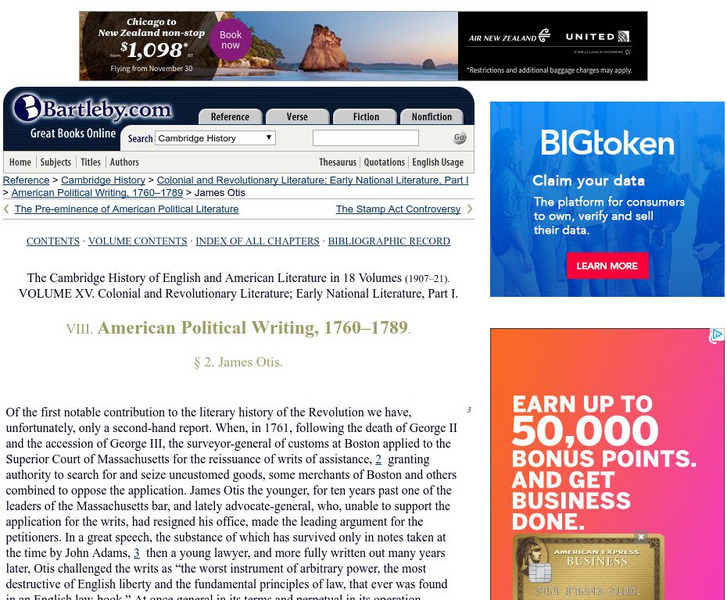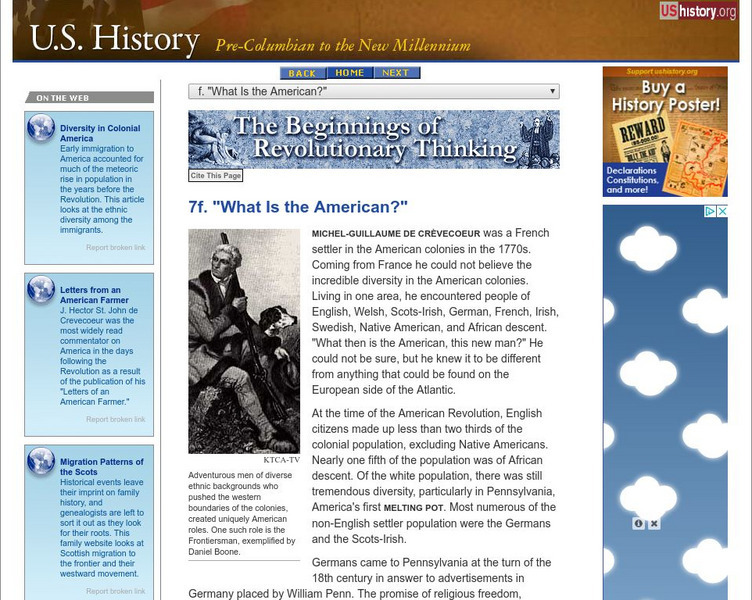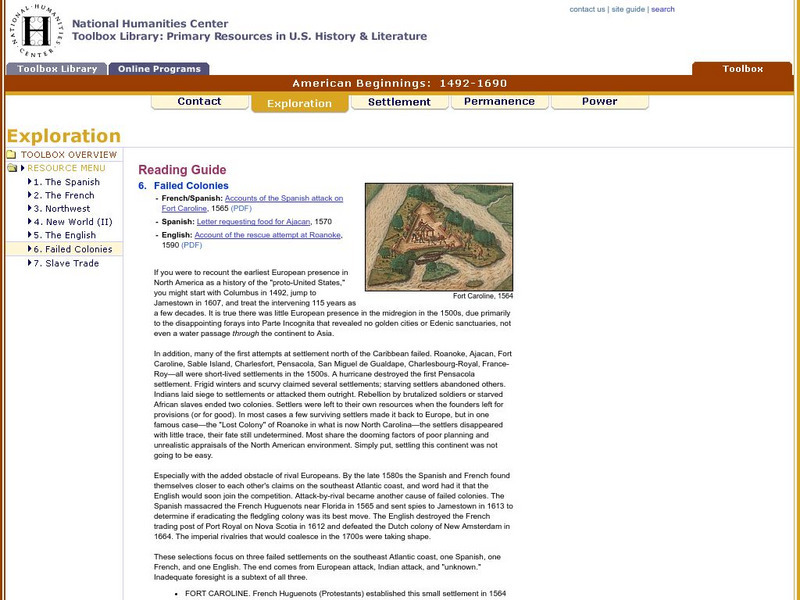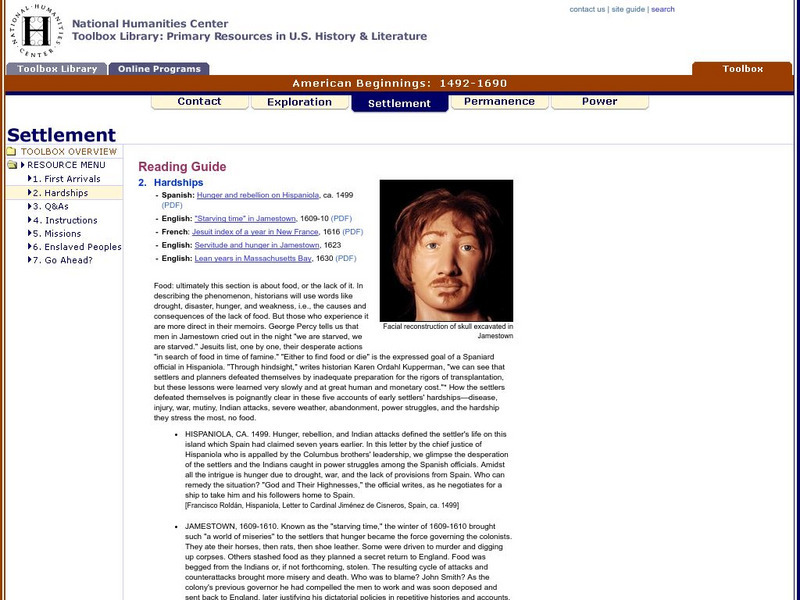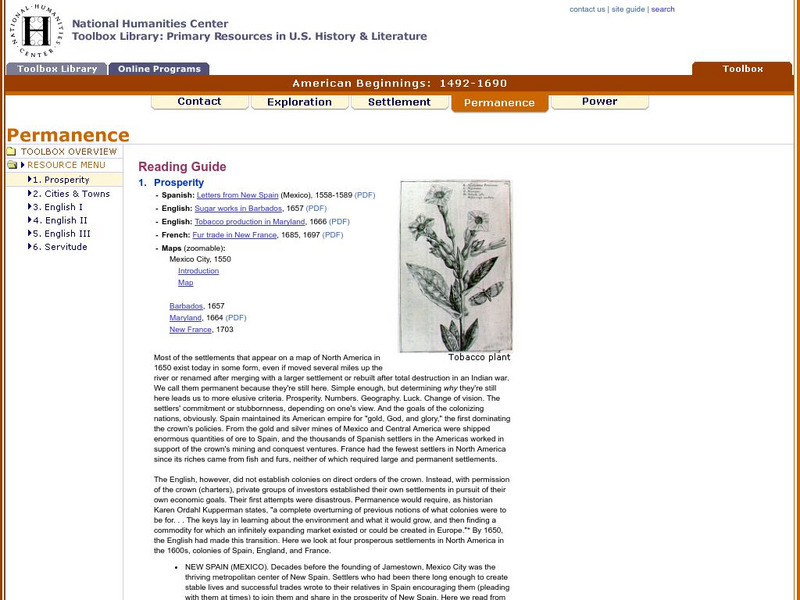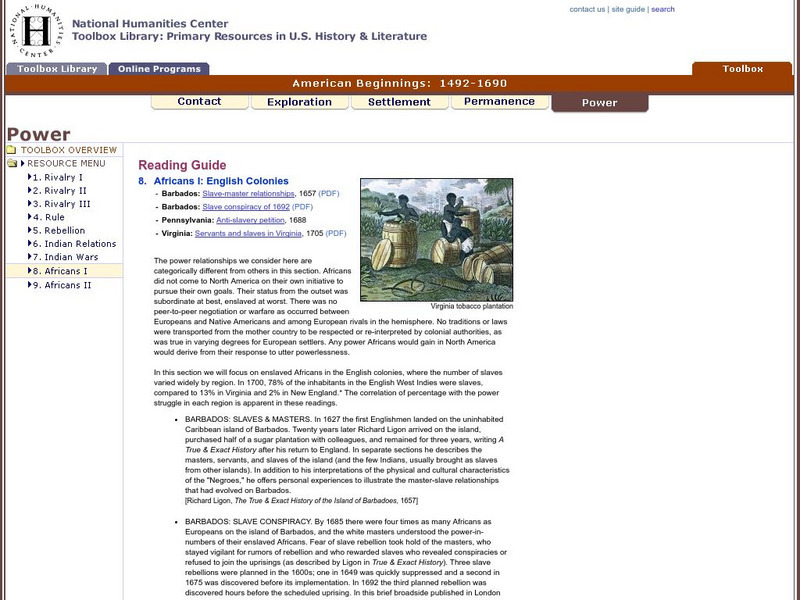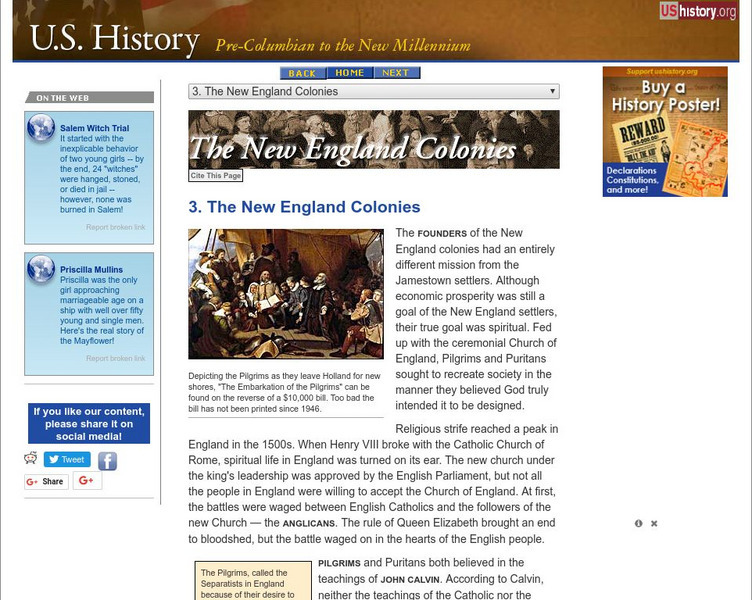Yale University
Yale New Haven Teachers Inst: Architecture of New England and Southern Colonies
This site is part of a curriculum unit containing in-depth and detailed information comparing the architecture of colonial New England and the colonial South. It discusses how the archictecture relects the lives and the society of the...
Bartleby
Bartleby.com: American Political Writing James Otis
This site discusses the political writings of James Otis concerning the British authority to search for smuggled goods with writs of assistance. Otis argued they were the worst violation of English liberties. This site contains quotes...
University of Groningen
American History: Outlines: The Frontier Fosters Self Reliance
Based on the theory that because the King had given the colonists so many freedoms, and he had problems on the home-front, the colonists' will was strengthened. This contributed to the Revolution. There are links to Virginia's First...
Schools of California Online Resources for Education
Local Court Procedure and Personell
A descritpion of court personell and each of their roles in Colonial court proceedings.
City University of New York
Revolutionary Generation: Political Traditions and Structures
This site has information pertaining to Britain's colonial policy. The policy of salutary neglect is covered. Links to sites for more information.
Council for Economic Education
Econ Ed Link: Taxation Without Representation?
Check out this informative site to learn more about life in the colonies before the Revolutionary War. Find out why the colonists had issues with "taxation without representation." "You will work independently and in pairs to learn about...
National Humanities Center
National Humanities Center: Toolbox Library: Rivalry Iii, American Beginnings: 1492 1690
Two maps of English and French rivalries in North America, and two side-by-side accounts of the English and French perspectives on King William's war over power, trade, and economic dominance of the continent.
Independence Hall Association
U.s. History: Beginnings of Revolutionary Thinking: What Is the American?
Even colonial America was a melting pot of people from far away. Read about the diversity of the population and why it had an effect on the possibility of rebellion and revolution.
National Humanities Center
National Humanities Center: Toolbox Library: Failed Colonies, American Beginnings: 1492 1690
Three European accounts of the disappointments, challenges, and outright failures to establish early successful colonial outposts in North America.
Other
North Carolina History Project: Roanoke Island
Describes the three expeditions organized by Sir Walter Raleigh to establish an English colony on Roanoke Island. The last group of colonists who settled there in 1587 disappeared and their fate is still not known for certain.
Other
Totally History: Virginia Dare
Explains the history of the lost Roanoke Colony and the various theories about what may have happened to the colonists. Virginia Dare was the first English child born in the New World, yet no one knows what eventually happened to her.
Other
First Colony Foundation: The Roanoke Colonies
The First Colony Foundation is an organization that conducts research into the English colonies that Sir Walter Raleigh sought to establish on Roanoke Island in North Carolina. This page presents a history of what is known about the...
Digital History
Digital History: The Emergence of New Ideas About Personal Liberties
American colonists expected to have "English rights" as supported by the Magna Carta and the English Bill of Rights. See how these rights were applied in the trial of John Peter Zenger, whose acquittal reflected the right of freedom of...
Other
College of William & Mary: Williamsburg Heritage Dancers
This page contains instructions for popular English country dances performed during the 17th and 18th centuries.
Other
Encyclopedia Virginia: Christopher Newport
Biographical information about English explorer, Christopher Newport, who commanded the first fleet sent by the Virginia Company to America, and who helped the colonists found Jamestown colony. A timeline outlines his active sailing career.
National Humanities Center
National Humanities Center: Toolbox Library: First Arrivals, American Beginnings: 1492 1690
Numerous visual images of artifacts from English settlements at Jamestown and at Plymouth, and from Spanish settlement in Hispaniola, and three original accounts of each of those early settlements that describe the possibilities and the...
National Humanities Center
National Humanities Center: Toolbox Library: Hardships, American Beginnings: 1492 1690
Three English, a French, and a Spanish primary account of the staggering losses, misery, and deprivation that characterized early European settlement as well as the resilience needed to overcome those challenges.
National Humanities Center
National Humanities Center: Toolbox Library: Prosperity, American Beginnings: 1492 1690
Four original source accounts, and four related maps, of successful English, French, and Spanish settlements in North America and the Caribbean that explain the qualities of these settlements and their reasons for permanence and prosperity.
National Humanities Center
National Humanities Center: Toolbox Library: Servitude, American Beginnings: 1492 1690
Two examples of indenture contracts and three accounts of indentured servitude, including positive as well as admonitory views, in the Chesapeake English colonies.
Independence Hall Association
U.s. History: Britain in the New World: The House of Burgesses
The Virginia House of Burgesses was the first elected legislature in the New World. Find out why the governmental conditions in England led to this representative government and how it was so different from the governing of colonies in...
National Humanities Center
National Humanities Center: Toolbox Library: Questions & Answers, American Beginnings: 1492 1690
An online exhibition of images of European settlement to accompany two English, a French, and a Dutch set of promotional accounts that offer advice, encouragement, and occasional warning to prospective immigrants to newly settled areas...
National Humanities Center
National Humanities Center: Toolbox Library: Africans I, American Beginnings: 1492 1690
Four accounts of the complex power relationships between slaves and slave holders within English colonies in Barbados, Virginia and Pennsylvania, as well as documents about slave revolts and anti-slavery agitation.
University of Groningen
American History: Outlines: Second Generation of British Colonies
The religious and civil conflict in England in the mid-17th century limited immigration, as well as the attention the mother country paid the fledgling American colonies. In part to provide for the defense measures England was...
Independence Hall Association
U.s. History: The New England Colonies
New England colonies and society were very different from the Jamestown and subsequent Southern colonies. Find out the reasons the colonists had for founding the New England colonies.



